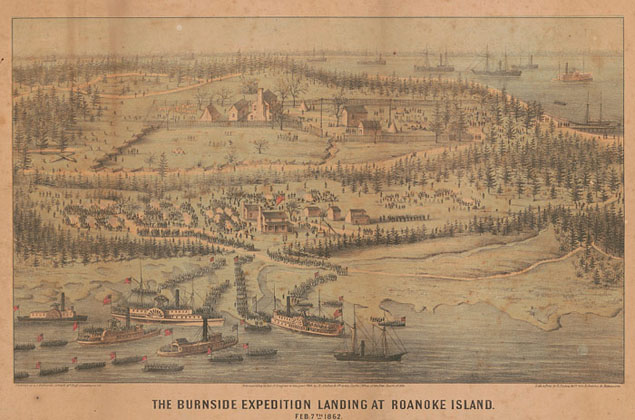
Library of Congress
The outbreak of the Civil War did not initially affect the people living on Roanoke Island. Isolated physically by water from the mainland and psychologically away from the mainstream of Southern society, the Bankers continued on with their lives in a large measure oblivious to what was tearing apart the rest of the country. While many individuals throughout North Carolina actively supported the Confederate cause, this was not necessarily the case in the Outer Banks, especially on Roanoke Island. The people of Roanoke Island were described as “rather indifferent” concerning the war. They wished to be merely left alone, even though some owned a considerable amount of slaves. However, the Union’s blockade of the South would see its formative stages implemented on the North Carolina coastal region, bringing this sense of unawareness to an abrupt halt.
Both the Union Navy and the forces of the Confederacy realized that the Outer Banks and Roanoke Island were not only the key to any initial penetration of the Southern defenses in North Carolina but also the back door to the strategic naval base at Norfolk, Virginia. Additionally, Roanoke was at the epicenter of the Pamlico and Albemarle Sounds and a key to the inland waterway traffic. Initially, the Confederacy was able to have a number of its warships, blockade-runners, and privateers sally forth from the Outer Banks area. Vitally needed goods flowed into the Confederacy through the porous North Carolina coastline. Confederate forces also managed to capture several Union prizes before the strength of the Union Navy was brought to bear. Consequently, the Confederacy massed men and equipment to defend the Outer Banks and Roanoke Island while Union forces concentrated for the first major naval offensive of the war.
These actions led to the Battle of Roanoke Island and the subsequent Union occupation of Roanoke Island led, in turn, to the establishment of a Freedmen's Colony on the island.
Last updated: September 14, 2017
